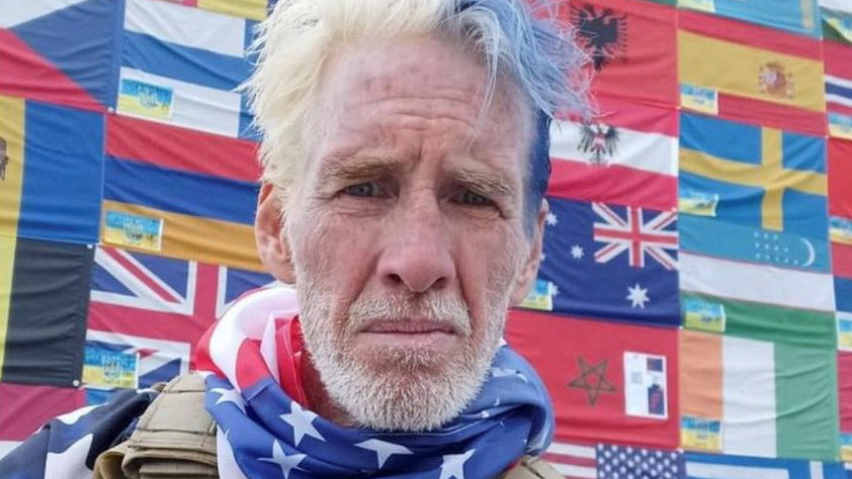He's accused of trying to assassinate Trump. At trial, he's going it alone

- Published
The trial of an alleged would-be presidential assassin started as many trials do: with jury selection.
But before US District Judge Aileen Cannon called prospective jurors into the Fort Pierce, Florida courtroom, she needed clarity on a screening question from the defence.
"There's a question about, a turtle in the road, would one stop or move it?" Judge Cannon said Monday.
Lawyers typically do not pose such whimsical questions during voir dire - the process by which potential jurors are screened - but then, the man who submitted it isn't a lawyer. He's the defendant.
Ryan Routh, 59, who has been charged with attempting to assassinate President Donald Trump last September, is representing himself.
Prosecutors accuse Routh of staking out the perimeter of Trump's golf course in West Palm Beach while the president played, with the intention of killing him.
Agents with the Federal Bureau of Investigation said they found a SKS semiautomatic rifle with a scope and extended magazine in the area where Routh was hiding. Prosecutors say he fired on an agent who discovered him then fled. He also allegedly left behind a list of places where Trump was expected to appear, and a note for a friend stating, "This was an assassination attempt on Donald Trump."
The government charged Routh with attempted assassination of a major presidential candidate, assaulting a federal officer, and two firearms-related crimes. He pleaded not guilty to all charges and despite the severity of his situation, asked to defend himself at trial.
But the eccentricities of this defendant belie the seriousness of the case.
A stream of odd inquiries submitted to the court include a request to challenge President Trump to "a beatdown session" or a round of golf.
He also asked to call Trump as a witness, describing the president in court documents as an "insecure ego idiot – mad fool."
On Monday, federal prosecutor John Shipley Jr wanted the turtle question stricken. The "silliness" of the formulation was "lightening the subject matter of this trial," he told Judge Cannon.
"I don't know how I would change it," Routh responded. However, he explained that he placed an "X" next to the question when he submitted it, because he did not think it was very good.
His other questions for potential jurors – about student protests for Palestine, or the US purchasing Greenland – were "off base," Judge Cannon told him.
Seated alone at the defence table and dressed in a grey jacket and red-striped tie, Routh joined the process of whittling down 180 local residents to 12 jurors and four alternates.
"I'm sorry to bring you all in here," Routh said as the first 60 took their seats.
He gave a great deference to some who said they could not serve due to personal reasons.
A man who taught children with autism should be excused because "it's a very honorable profession," said Routh, and the man should "continue his work."
Judge Cannon reminded Routh on several occasions that he could, in fact, object to the government's proposed strikes.
Routh fought the dismissal of one juror: a person who prosecutors said made comments about President Trump, believed "felons should have their voting rights restored," and who indicated on the jury questionnaire that they got their news "from television or my sugar mama."
"I'd obviously like to keep this juror," Routh said.
Judge Cannon struck 20 jurors from the pool on Monday, and the court will bring in a new group on Tuesday for consideration (the juror Routh defended remained in the pool, though the judge indicated they could still be struck for cause).
In July, the judge approved Routh's request to represent himself, but ordered court-appointed attorneys to be on standby and warned him that his lawyers would represent him "far better".
"I strongly urge you not to make this decision," she told him.
At the time, Routh said his lawyers were not answering his questions and that they were "a million miles apart".
Trial lawyer Neama Rahmani, who is not involved in this case, said it is "not common for defendants to represent themselves".
"Those who do at their own peril have a very high conviction rate, and I don't expect this case to be any different. It's never a good idea to proceed pro se, especially in a high profile case against experienced federal prosecutors," he said.
Routh's alleged attempt on Trump's life occurred two months after a gunman opened fire at a Trump rally in Pennsylvania, wounding Trump's ear and killing a supporter. The two incidents put a spotlight on escalating political violence in months leading up to the 2024 election, and prompted government inquiries into the US Secret Service.
Though Trump was not in court and is unlikely to take the witness stand, his presence loomed large over the proceedings.
He faced charges in the same courthouse, before the same judge, in a criminal case over alleged mishandling of classified documents from his first term in the White House. Trump's re-election officially ended the case.
Now as president, his portrait hangs in the entrance to the federal courthouse, just over the metal detectors.
Madeline Halpert contributed to this report.